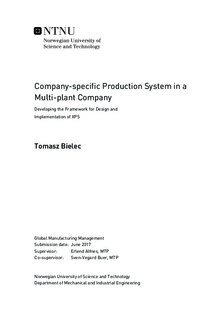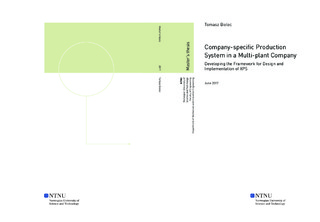| dc.description.abstract | Success story of Toyota had many followers, however not all of them succeed. Contingency theory suggest that there is no universal improvement approach that fits to all organizations. Each improvement programme has to be contingent on certain situation. As a respond to that issue, there has been observed recently a noticeable trend among multi-plant companies in developing company-specific production systems that are often customized versions of Toyota Production System. Company strategically selects tools and best practices from the improvement programmes such as just-in-time, Total Quality Management or Six Sigma and fit them into the organization s unique characteristics, objectives and local contingencies. The company-specific production system is termed XPS. The X stands for the company name and PS usually for the production system. The XPS is a corporate improvement programme that is developed at headquarter and applied to all subsidiaries within a manufacturing network to improve simultaneously their performance. XPS creates a common platform for all the plants within an organization and allows transferring the best practices across them.
However, there is a risk that by applying one common improvement programme, local resources, capabilities and unique characteristics of subsidiaries may not be utilized. If headquarter utilizes equal management approach toward all plants without considering their unique characteristics, it might provide a compromised system where some of the subsidiaries are not managed properly. Although many cases of successful XPS implementation of XPS are documented, the concept has received rather limited attention from an academic perspective. There is a lack of established methods and guidelines for design and implementation of multi-plant improvement programmes.
The objective of this study was to develop a framework to support design and implementation of XPS in a multi-plant company that takes into consideration unique characteristics of each plant. To achieve this objective four research questions have been answered:
(1) What is the content of XPS?
(2) What are the benefits of XPS?
(3) What factors should be considered whether to standardize best practices across subsidiaries or adapt them at each subsidiary?
(4) How to manage an implementation of XPS in multi-plant company?
This research present a number of relevant findings to the multi-plant improvement programme theory such as new typology of XPS.
The framework was developed based on the findings from qualitative literature study. The framework consists of three phases: (1) conceptual, (2) design and (3) implementation. Each phase contains several technical stages and corresponding organizational factors that must be considered before moving to the next phase. As a part of the framework, a tool for XPS design was developed. The tool allows mapping of company s current situation, competitive priorities and improvement objectives. It considers subsidiary s characteristics such as product, manufacturing processes and demand to support a choice of best practices and decide whether to standardize practices across subsidiaries or adapt them to respond to the unique characteristics of subsidiaries. The new XPS typology was proposed that consider the degree of best practices standardization and the way in which XPS is managed.
In order to test and validate the framework, a case study at the Norwegian furniture manufacturer Ekornes was performed. Through the tool for XPS design, a set of practices that address the Ekornes improvements objectives was developed. It was concluded that due to the unique characteristics of subsidiaries, some practices have to be adapted first in order to fit the local context. Based on the number of internal determinants, research suggested that Ekornes should employ decentralized approach to manage its XPS. | |

